人教课标版高中英语选修8 Unit5 Meeting your ancestors reading (共36张PPT)
文档属性
| 名称 | 人教课标版高中英语选修8 Unit5 Meeting your ancestors reading (共36张PPT) | 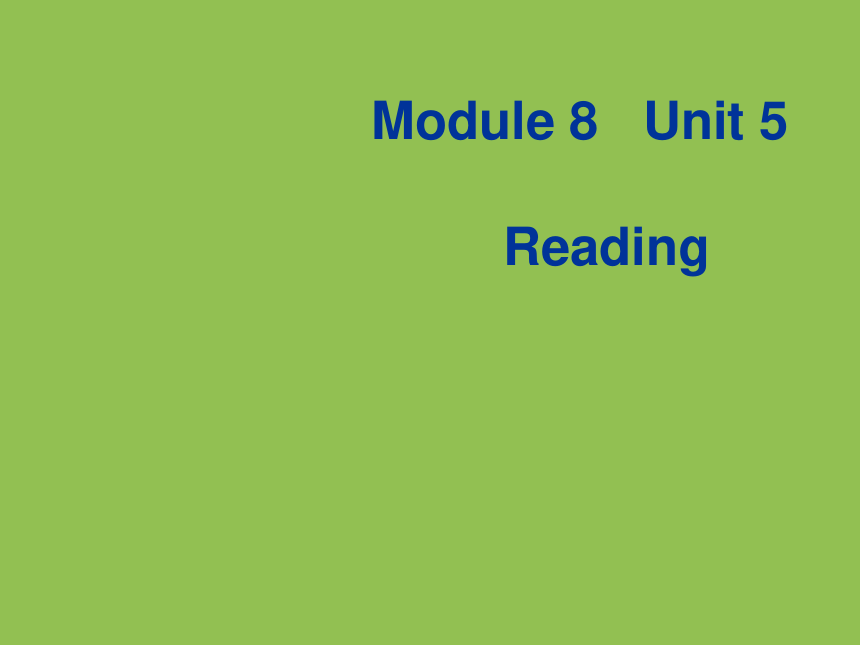 | |
| 格式 | zip | ||
| 文件大小 | 1.7MB | ||
| 资源类型 | 教案 | ||
| 版本资源 | 人教版(新课程标准) | ||
| 科目 | 英语 | ||
| 更新时间 | 2020-06-25 16:01:41 | ||
图片预览

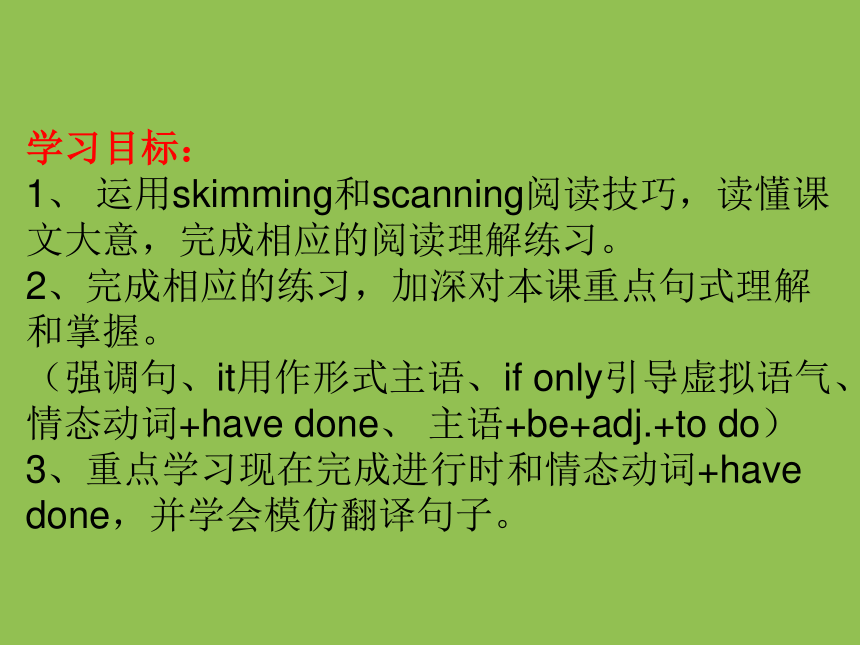

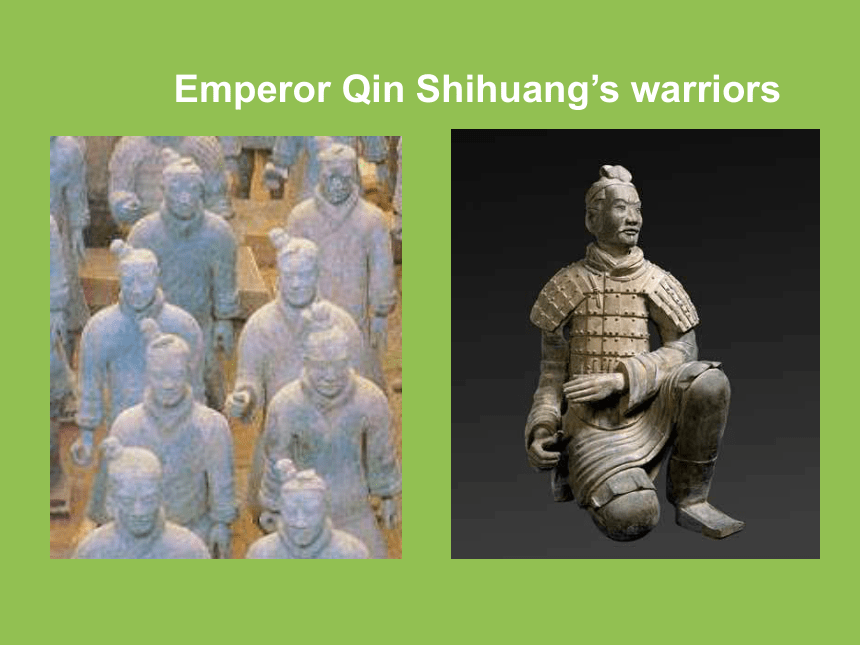
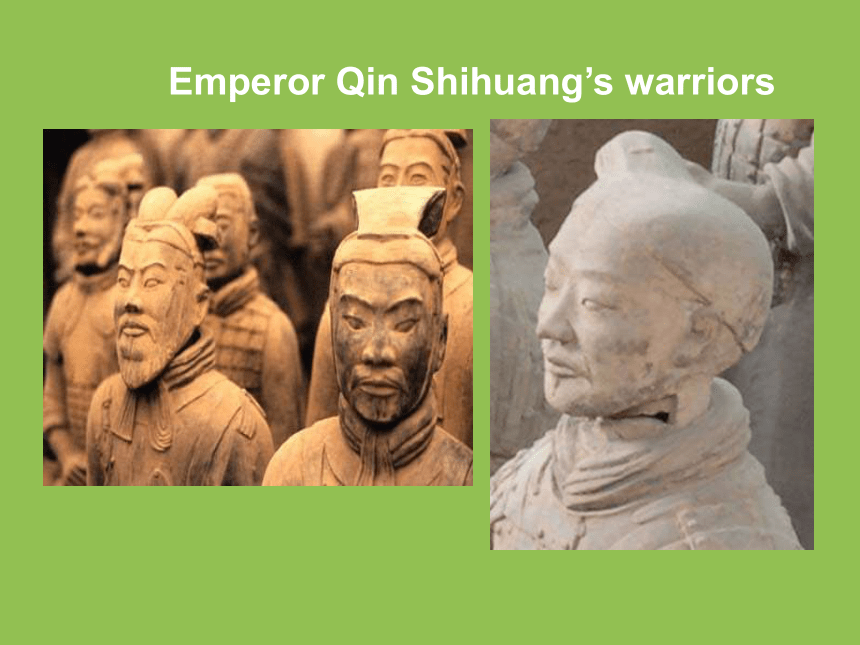
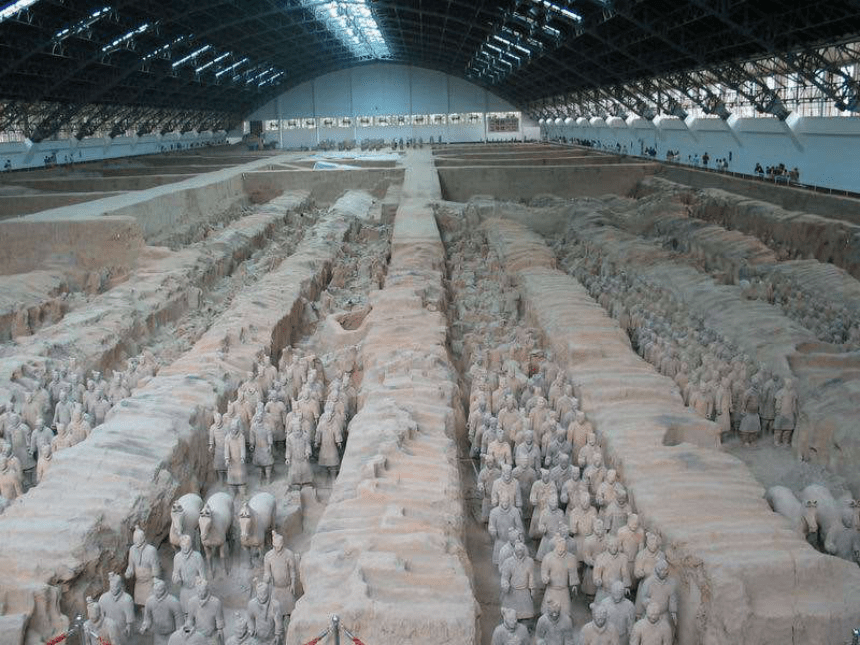
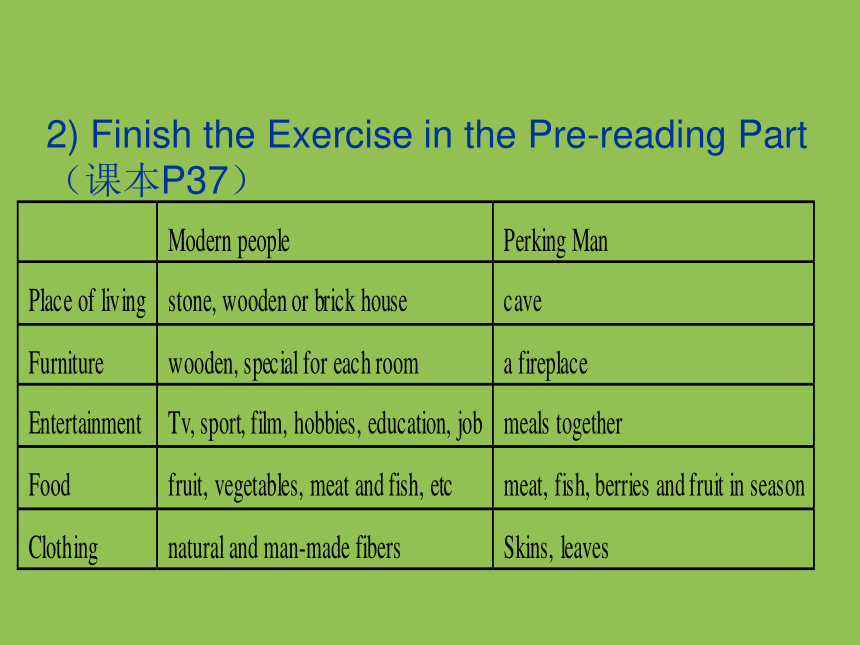
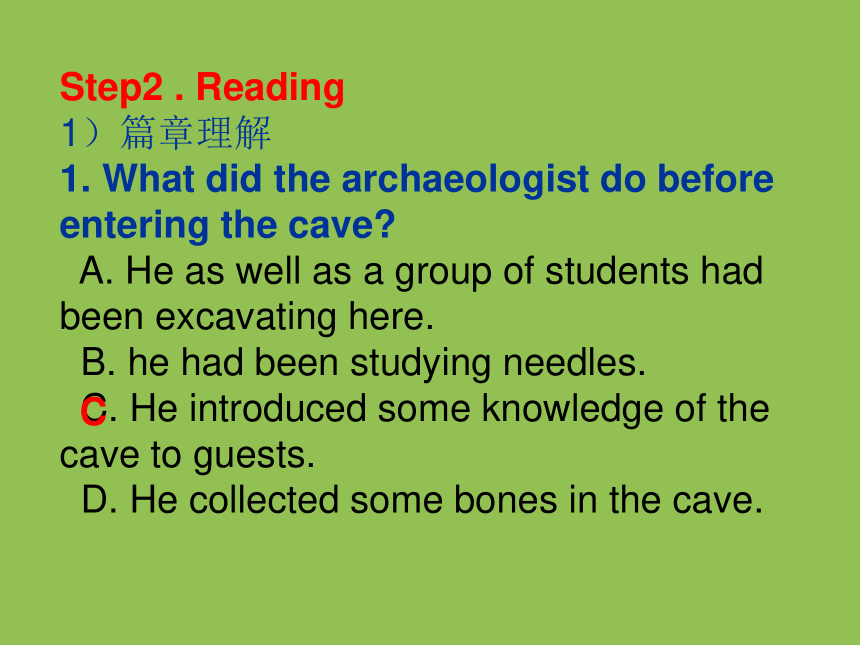
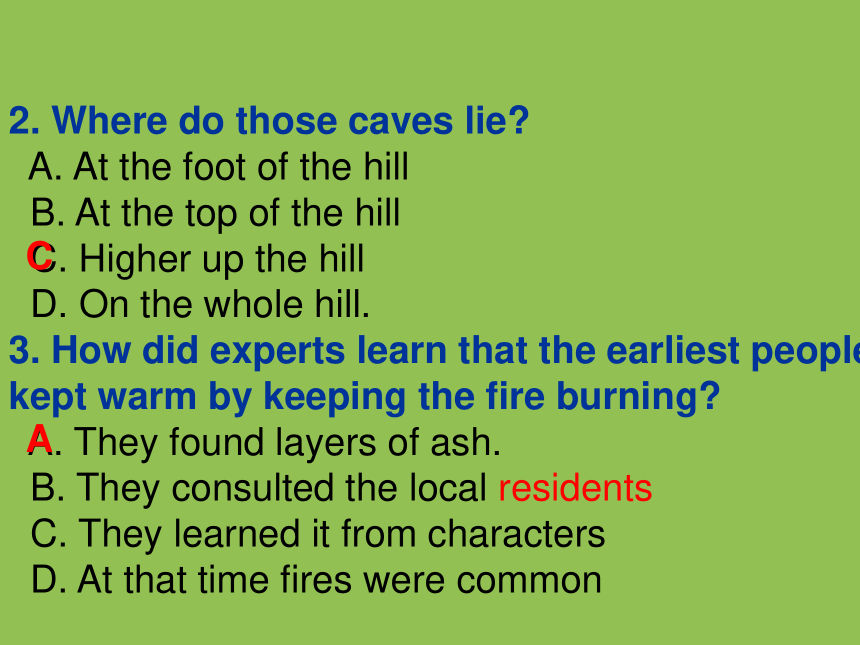
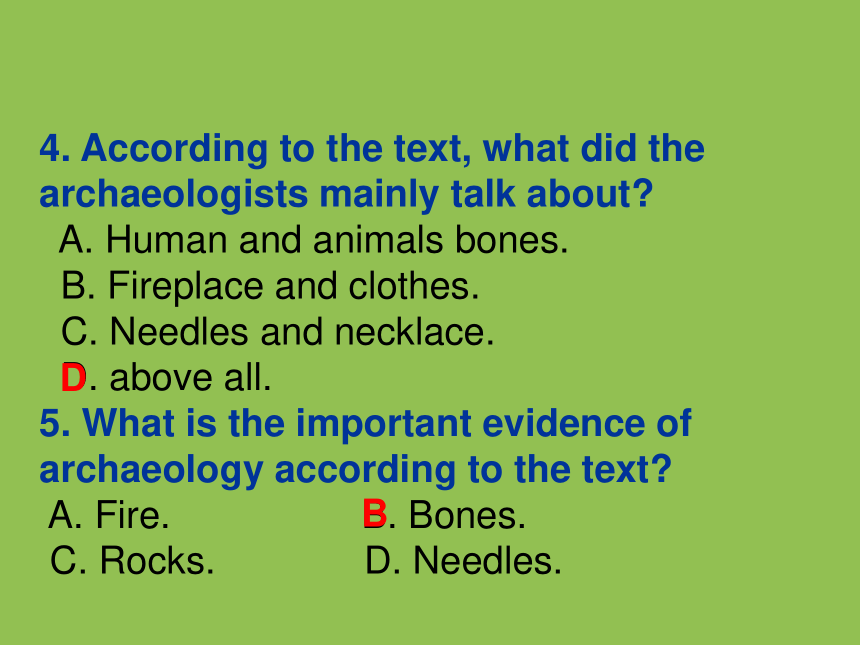
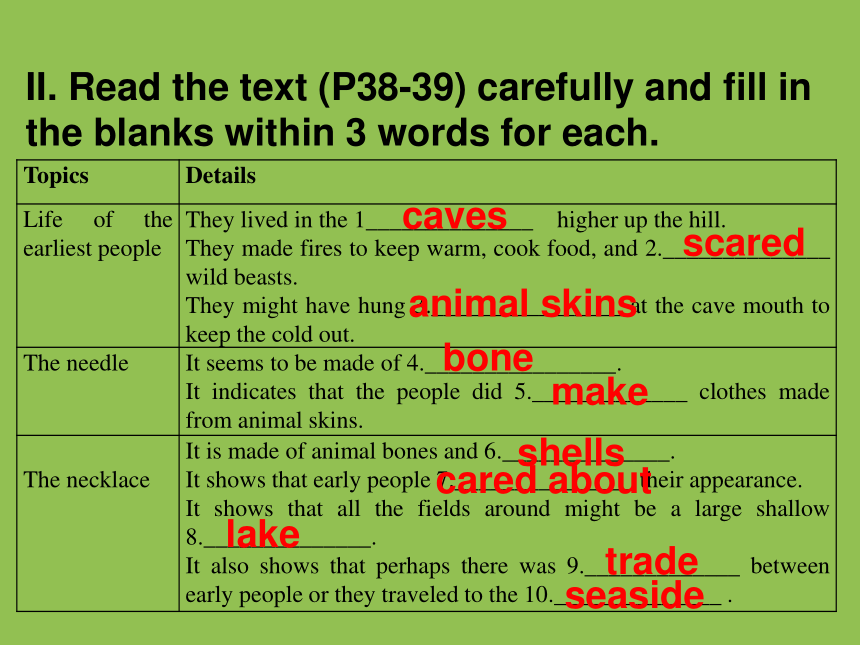

文档简介
(共36张PPT)
Module
8
Unit
5
Reading
学习目标:
1、
运用skimming和scanning阅读技巧,读懂课文大意,完成相应的阅读理解练习。
2、完成相应的练习,加深对本课重点句式理解和掌握。
(强调句、it用作形式主语、if
only引导虚拟语气、情态动词+have
done、
主语+be+adj.+to
do)
3、重点学习现在完成进行时和情态动词+have
done,并学会模仿翻译句子。
Step1.Waiming
up
and
Pre-reading
1)Talk
about
some
archaeological
findings
by
showing
some
pictures
on
the
screen
Emperor
Qin
Shihuang’s
warriors
Emperor
Qin
Shihuang’s
warriors
2)
Finish
the
Exercise
in
the
Pre-reading
Part(课本P37)
Step2
.
Reading
1)篇章理解
1.
What
did
the
archaeologist
do
before
entering
the
cave?
A.
He
as
well
as
a
group
of
students
had
been
excavating
here.
B.
he
had
been
studying
needles.
C.
He
introduced
some
knowledge
of
the
cave
to
guests.
D.
He
collected
some
bones
in
the
cave.
C
2.
Where
do
those
caves
lie?
A.
At
the
foot
of
the
hill
B.
At
the
top
of
the
hill
C.
Higher
up
the
hill
D.
On
the
whole
hill.
3.
How
did
experts
learn
that
the
earliest
people
kept
warm
by
keeping
the
fire
burning?
A.
They
found
layers
of
ash.
B.
They
consulted
the
local
residents
C.
They
learned
it
from
characters
D.
At
that
time
fires
were
common
C
A
4.
According
to
the
text,
what
did
the
archaeologists
mainly
talk
about?
A.
Human
and
animals
bones.
B.
Fireplace
and
clothes.
C.
Needles
and
necklace.
D.
above
all.
5.
What
is
the
important
evidence
of
archaeology
according
to
the
text?
A.
Fire.
B.
Bones.
C.
Rocks.
D.
Needles.
D
B
II.
Read
the
text
(P38-39)
carefully
and
fill
in
the
blanks
within
3
words
for
each.
caves
scared
animal
skins
bone
make
shells
cared
about
lake
trade
seaside
Topics
Details
Life
of
the
earliest
people
They
lived
in
the
1______________ higher
up
the
hill.
They
made
fires
to
keep
warm,
cook
food,
and
2.______________
wild
beasts.
They
might
have
hung
3.________________
at
the
cave
mouth
to
keep
the
cold
out.
The
needle
It
seems
to
be
made
of
4.________________.
It
indicates
that
the
people
did
5._____________
clothes
made
from
animal
skins.
The
necklace
It
is
made
of
animal
bones
and
6.______________.
It
shows
that
early
people
7._______________
their
appearance.
It
shows
that
all
the
fields
around
might
be
a
large
shallow
8.______________.
It
also
shows
that
perhaps
there
was
9._____________
between
early
people
or
they
traveled
to
the
10.______________
.
3)阅读课文,试着用30来个单词概括课文大意。
The
text
tells
us
a
scene
that
shows
a
conversation
between
a
group
of
students
and
the
archaeologist.
From
the
conversation,
students
get
some
information
about
the
Zhoukoudian
caves
before
history.
Step
3
.
Retelling:
Fill
in
the
blanks
A
group
of
students
from
England
has
come
to
the
Zhoukoudian
caves
1.___
a
visit.
2.____
archaeologist
is
showing
them
round.
The
archaeologists
3.
________________
(excavate)
here
for
many
years.
After
4.________
(find)human
and
animal
bones
in
those
caves
higher
up
the
hill
as
well
as
tools
and
other
objects,
they
think
5._____
is
reasonable
to
assume
they
lived
in
these
caves,
regardless
of
the
cold.
They
discovered
fireplaces
in
the
centre
of
the
caves
6.________
they
made
fires.
Some
evidence
suggests
that
our
ancestors
did
wear
clothes
7._______
(make)
from
animal
skins.
The
archaeologist
also
shows
the
for
An
have
been
excavating
finding
it
where
made
students
a
primitive
necklace
8._______
(preserve)
quite
well.
Indeed,
as
the
botanical
analyses
have
shown
us,
all
the
fields
around
here
9.________
(use)
to
be
part
of
a
large
shallow
lake.
Perhaps
there
was
trade
between
early
people
10.________
they
traveled
to
the
seaside
on
their
journey.
preserved
used
or
IV.
Reading
comprehension
(根据课文The
Feast:18,000
BC
on
P43选择正确答案)
1.What
is
the
main
idea
of
the
passage?
The
marriage
life
of
Lala
and
Dahu.
B.
The
separate
responsibility
of
men
and
women.
C.
The
difference
between
early
life
and
modern
life.
D.
The
preparations
for
a
feast.
D
2.
Why
did
Lala
accelerate
her
walk?
A.
Because
she
was
very
hungry.
B.
Because
she
feared
her
husband
would
get
angry.
C.
Because
she
had
to
prepare
for
the
feast.
D.
Because
she
feared
there
might
be
wild
animals
attacking
her.
3.
Lala
was
happy
last
year
because
_______.
A.she
was
lucky
to
be
chosen
by
Dahu.
B.
she
didn’t
have
to
prepare
for
the
feast
C.
her
husband
loved
her
very
much
D.
she
was
together
with
her
sister
and
mother
D
A
4.
According
to
the
passage,
Dahu
usually
did
all
the
things
except
____________.
A.
fishing
B.
collecting
fruit
C.
sharpening
scrapers
D.
killing
animals
5.
We
can
infer
from
the
passage
that
Lala
was
________
her
life.
A.
tired
of
B.
worried
about
C.
satisfied
with
D.
disappointed
with
B
C
V.
语法填空(根据课文内容The
Feast:18,000
BC
on
P43,依据语法规则完成短文)
Not
having
looked
1.________
and
planned
better,
Lala
felt
very
worried
about
the
2._________________
(prepare)
for
her
feast.
So
she
turned
for
home
quickly
with
her
3.___________(collect)of
nuts,
melons
and
other
fruit.
When
she
was
near
home,
a
delicious
smell
4.____________
(arrest)
her
progress
and
her
senses
became
dizzy
5._________
hunger.
She
saw
her
mother
and
the
older
children
preparing
the
deer
and
pig
meat
over
the
fire.
Just
then
Dahu,
her
husband
as
well
as
the
best
toolmaker,
came
back
with
several
fish.
Later
he
began
his
task:
he
6._____________
(sharpen)
his
scrapers
until
they
were
sharp
enough
to
cut
7.______
the
meat
and
scrape
the
fish.
Soon,
the
first
of
the
guests
began
to
arrive.
Lala
hoped
it
was
going
to
be
just
as
8.______________
(wonder)
as
last
year.
ahead
preparations
collection
arrested
with
sharpened
up
wonderful
(二)再次阅读本单元两篇课文,在课文划出并翻译下面表达并熟记之。
1.带领某人参观
2.意识到;认识到
3.不管,不顾
4.
保暖
5.
生火
6.
吓跑野兽
7.
以及,也
8.
使火持续燃烧
9.
驱寒
10.
在寒冷的冬天
show
sb
round
be
aware
of/that
regardless
of
keep
warm
make
fire
scare
wild
beasts
away
as
well
keep
the
fire
burning
keep
out
the
cold
during/in
the
freezing
winter
(二)再次阅读本单元两篇课文,在课文划出并翻译下面表达并熟记之。
11.
切碎
12.
大量的
13.
在乎;介意;关心
14.
保存完好的
15.
看起来非常像…
16.
曾经是
17.
正如生物分析的结果告诉我们
18.
四处走动
19.
一群群的动物
20.
带着…迅速赶回家
cut
up
an
ample
amount
of
care
about
well
preserved
look
very
much
like
used
to
be
as
the
botanical
analyses
have
shown
us,
…
move
around
the
herds
of
animals
quickly
turn
for
home
with
(二)再次阅读本单元两篇课文,在课文划出并翻译下面表达并熟记之。
21.在不同的地方相聚
22.要是…就好了;但愿
23.选…为…
24.一件非常光荣的事情
25.
早有预见;为将来打算
26.加快…的脚步
27.到达目的地
28.停止前进
29.弥漫在周围的空气
30.
因…感到眩晕
at
different
sites
for
reunions
if
only
choose
…as…
a
great
honour
look
ahead
accelerate
her
walk
up…to…
teach
one’s
destination
arrest
one’s
progress
fill
the
air
surrounding
sb.
be
dizzy
with
(二)再次阅读本单元两篇课文,在课文划出并翻译下面表达并熟记之。
31.
结果被…一把抱起
32.
宽慰地
33.走近;发生;
被提出;长出;发芽
34.拔出;抽出;取出
35.时不时地
36.切碎
37.开始来吃饭
only
to
be
scooped
by…
with
relief
come
up
pull
out
now
and
then
cut
up
begin
to
arrive
for
dinner
A.
在课文中找出并摘抄2个使用现在完成进行时的句子
1)______________________________________________
2)
______________________________________________
归纳:现在完成进行时(the
present
perfect
continuous
tense)的结构:_____________________________
1.表示动作从过去某一时间开始一直延续到现在。多用延续性动词。
1)
I
have
been
fixing
the
refrigerator
all
this
morning.(动作可能继续下去)
2)
Have
you
been
waiting
long
for
me?
(动作不再继续)
2
动作在断断续续地重复
1)You
have
been
saying
you
can
succeed
for
five
years.
2)
The
writer
has
been
writing
a
novel
this
month.
We’ve
been
excavating
here
for
many
years
and..
We’ve
been
finding
the
bones
of
tigers
and
bears..
have/has
been
doing
3
表示带有强烈的喜欢或厌恶等感彩
I
have
been
expecting
to
meet
you
for
a
long
time.
4
和现在完成时(写出结构:_______________)的区别
I
have
been
living
here
for
10
years.
=
I
have
lived
here
for
10
years.
2)
I
have
been
learning
English
for
8
years.
=
I
have
learnt
English
for
8
years.
3)
I
have
just
cleaned
the
room.
该句不能用现在完成进行时替换
4)
She
has
already
had
breakfast.
该句不能用现在完成进行时替换
have
/has
done
【模仿1】你们最近忙些什么?我们一直在准备学业水平测试。
【模仿2】我们已和他讨论了那个问题。
【模仿3】整个晚上,我们一直在和他讨论那个问题。
What
have
you
been
doing?
We
have
been
preparing
for
the
proficient
tests.
We
have
discussed
the
problem
with
him.
We
have
been
discussing
the
problem
with
him
all
the
night.
B.
在课文中找出并摘抄3个使用情态动词+have
done的句子:
They
couldn’t
have
mats,
blankets
or
quilts
like
we
do.
It
must
have
been
very
uncomfortable.
2.
We
have
been
excavating
layers
of
ash
almost
six
metres
thick,
which
suggests
that
they
might
have
kept
the
fire
burning
all
winter.
3.
We
haven’t
found
any
doors
but
we
think
they
might
have
hung
animal
skins
at
the
cave
mouth
to
keep
out
the
cold
during
the
freezing
winter.
4.
What
else
do
you
think
it
might
have
been
used
for?
归纳:情态动词+have
done表示对过去事情的推测
1、must
have
done
表示对过去事情很有把握的推测,意为“肯定,一定”,仅用于肯定句
【模仿1】(1)
这里一个人都没有,他们一定全都回家了。
(2)地板很潮湿,昨晚上肯定下雨了。
There
is
nobody
here.
They
must
have
all
gone
home.
The
ground
is
wet.
It
must
have
rained
last
night.
【模仿2】cannot(couldn’t)
have
done表示对过去不可能发生的事情进行推测,多用于否定句和疑问句,
。
(3)地板很干燥。昨天晚上绝对不可能下雨。
The
ground
is
dry.
It
can’t
have
rained
last
night.
(4)我今天早上没有在会议室见到他。他不可能在会议上发言
I
didn’t
see
him
in
he
meeting
room
this
morning.
He
couldn’t
have
spoken
at
the
meeting.
B:表示对某事的责备和批评,常用于这种用法的情态动词有might,
could,
need,
ought
to,
should;
might语气最弱should
语气最强,属于虚拟语气的用法
【模仿3】should
have
done
本来应该做(但没有做);shouldn’t
have
done
本来不应该做(但做了);
两皆含有强烈责备批评的语气
(5)你本来应该按时完成作业的。
You
should
have
finished
your
home
work
on
time.
(6)他们本不应该仅仅因为他要就给他那么多钱的。
They
shouldn’t
have
given
him
so
much
money
only
because
he
asked
for.
【模仿4】could
/might
have
done表示委婉的批评,常翻译为“本来可以做得更…一些,本应该…”
(7)
如果你不偷懒的话,你本来可以做得更好。
If
you
hadn’t
been
lazy,
you
could
have
been
better.
(8)
你犯了几个错误,你本来应该更细心一些。
You
have
made
a
few
mistakes.
You
might
have
been
more
careful.
【模仿5】needn’t
have
done
本来不需要
(9)这么近,我们当时没有必要坐出租车的。
It’s
too
near.
We
needn’t
have
taken
a
taxi.
3.【原句】We
have
been
excavating
layers
of
ash
almost
six
metres
thick,
which
suggests
that
they
might
have
kept
the
fire
burning
all
winter.
[模仿要点]
suggest表“建议”其宾语从句用should
do虚拟语气;表“暗示”
其宾语从句用陈述语气陈述事实或可能发生的事,从句时态根据具体情况选用。
【模仿1】我建议我们现在就离开
I
suggest
(that)
we
should
leave
now.
【模仿2】他的表情暗示他对她的回答很满意
His
expression
suggested
that
he
was
satisfied
with
her
answer.
1.
A
group
of
students
__________
(come)
to
_______
Zhoukoudian
caves
______
a
visit
and
_______
archaeologist
is
showing
them
_________
2.
____
is
a
great
pleasure
to
meet
you
students
from
England,
_____
are
interested
in
archaeology.
3.
You
must
be
aware
that
it’s
here
_______
we
found
evidence
of
some
of
the
earliest
people…
4.
We
_____________________(
excavate)
here
for
many
years
and…
5.
How
did
they
keep
warm?
They
_____________
have
mats,
blankets
or
quilts
like
we
do.
It
________
uncomfortable.
It
who
that
have
been
excavating
couldn’t
must
have
been
has
come
the
for
an
round
6.We’ve
discovered
fireplaces
in
the
centre
of
the
caves
__________
they
made
fires.
That
_________________
them
warm,
cooked
the
food
and
scared
wild
beasts
as
well.
7.We
______________________
layers
of
ash
almost
six
metres
thick,
which
suggests
that
they
_______________
the
fire
__________
(burn)
all
winter.
8.
We
continue
___________(discover)
tools
that
________
(be)
sharpeners
for
other
tools.
9.
It
seems
_______
they
used
the
___________(sharp)
stone
tools
to
cup
up
animals
and
__________(remove)
their
skin.
where
would
have
kept
might
have
kept
burning
discovering
were
that
sharpened
remove
away
have
been
excavating
10.
Did
early
people
really
care
_______
their
appearance
______
we
do?
11.Perhaps
they
travelled
_____
the
seaside
_____
their
journeys.
12.
We
know
that
they
moved
_______,
_________
(follow)
the
_________
(herd)
of
animals.
13.
_________
(worry)
about
the
________
(prepare)
for
her
feast,
Lala
quickly
turned
______
home
______
her
collection
of
nuts,
melons
and
other
fruit.
14.
It
was
the
custom
of
family
groups
to
separate
and
then
gather
again
______
different
sites
for
________
(reunion).
about
like
around
following
herds
Worried
preparations
for
with
at
to
on
reunions
15.
At
that
time
she
had
been
so
happy
______
Dahu
chose
her
_____
the
future
mother
of
his
children.
16.The
smell
of
cooking
meat
filled
the
air
_______
(surround)
her,
and
her
senses
became
dizzy
______
hunger.
17.
If
only
she
_____________
(look)
ahead
and
planned
better
this
year!
18.
Dahu,
with
strongly
_________
(显著的)
eyebrows
and
cheekbones,
chose
one
large
stone
and
began
to
use
it
like
a
hammer
_____
(strike)
the
edge
of
the
scraper
that
needed
________
(sharp).
when
as
surrounding
with
had
looked
ahead
pronounced
striking
sharpening
Module
8
Unit
5
Reading
学习目标:
1、
运用skimming和scanning阅读技巧,读懂课文大意,完成相应的阅读理解练习。
2、完成相应的练习,加深对本课重点句式理解和掌握。
(强调句、it用作形式主语、if
only引导虚拟语气、情态动词+have
done、
主语+be+adj.+to
do)
3、重点学习现在完成进行时和情态动词+have
done,并学会模仿翻译句子。
Step1.Waiming
up
and
Pre-reading
1)Talk
about
some
archaeological
findings
by
showing
some
pictures
on
the
screen
Emperor
Qin
Shihuang’s
warriors
Emperor
Qin
Shihuang’s
warriors
2)
Finish
the
Exercise
in
the
Pre-reading
Part(课本P37)
Step2
.
Reading
1)篇章理解
1.
What
did
the
archaeologist
do
before
entering
the
cave?
A.
He
as
well
as
a
group
of
students
had
been
excavating
here.
B.
he
had
been
studying
needles.
C.
He
introduced
some
knowledge
of
the
cave
to
guests.
D.
He
collected
some
bones
in
the
cave.
C
2.
Where
do
those
caves
lie?
A.
At
the
foot
of
the
hill
B.
At
the
top
of
the
hill
C.
Higher
up
the
hill
D.
On
the
whole
hill.
3.
How
did
experts
learn
that
the
earliest
people
kept
warm
by
keeping
the
fire
burning?
A.
They
found
layers
of
ash.
B.
They
consulted
the
local
residents
C.
They
learned
it
from
characters
D.
At
that
time
fires
were
common
C
A
4.
According
to
the
text,
what
did
the
archaeologists
mainly
talk
about?
A.
Human
and
animals
bones.
B.
Fireplace
and
clothes.
C.
Needles
and
necklace.
D.
above
all.
5.
What
is
the
important
evidence
of
archaeology
according
to
the
text?
A.
Fire.
B.
Bones.
C.
Rocks.
D.
Needles.
D
B
II.
Read
the
text
(P38-39)
carefully
and
fill
in
the
blanks
within
3
words
for
each.
caves
scared
animal
skins
bone
make
shells
cared
about
lake
trade
seaside
Topics
Details
Life
of
the
earliest
people
They
lived
in
the
1______________ higher
up
the
hill.
They
made
fires
to
keep
warm,
cook
food,
and
2.______________
wild
beasts.
They
might
have
hung
3.________________
at
the
cave
mouth
to
keep
the
cold
out.
The
needle
It
seems
to
be
made
of
4.________________.
It
indicates
that
the
people
did
5._____________
clothes
made
from
animal
skins.
The
necklace
It
is
made
of
animal
bones
and
6.______________.
It
shows
that
early
people
7._______________
their
appearance.
It
shows
that
all
the
fields
around
might
be
a
large
shallow
8.______________.
It
also
shows
that
perhaps
there
was
9._____________
between
early
people
or
they
traveled
to
the
10.______________
.
3)阅读课文,试着用30来个单词概括课文大意。
The
text
tells
us
a
scene
that
shows
a
conversation
between
a
group
of
students
and
the
archaeologist.
From
the
conversation,
students
get
some
information
about
the
Zhoukoudian
caves
before
history.
Step
3
.
Retelling:
Fill
in
the
blanks
A
group
of
students
from
England
has
come
to
the
Zhoukoudian
caves
1.___
a
visit.
2.____
archaeologist
is
showing
them
round.
The
archaeologists
3.
________________
(excavate)
here
for
many
years.
After
4.________
(find)human
and
animal
bones
in
those
caves
higher
up
the
hill
as
well
as
tools
and
other
objects,
they
think
5._____
is
reasonable
to
assume
they
lived
in
these
caves,
regardless
of
the
cold.
They
discovered
fireplaces
in
the
centre
of
the
caves
6.________
they
made
fires.
Some
evidence
suggests
that
our
ancestors
did
wear
clothes
7._______
(make)
from
animal
skins.
The
archaeologist
also
shows
the
for
An
have
been
excavating
finding
it
where
made
students
a
primitive
necklace
8._______
(preserve)
quite
well.
Indeed,
as
the
botanical
analyses
have
shown
us,
all
the
fields
around
here
9.________
(use)
to
be
part
of
a
large
shallow
lake.
Perhaps
there
was
trade
between
early
people
10.________
they
traveled
to
the
seaside
on
their
journey.
preserved
used
or
IV.
Reading
comprehension
(根据课文The
Feast:18,000
BC
on
P43选择正确答案)
1.What
is
the
main
idea
of
the
passage?
The
marriage
life
of
Lala
and
Dahu.
B.
The
separate
responsibility
of
men
and
women.
C.
The
difference
between
early
life
and
modern
life.
D.
The
preparations
for
a
feast.
D
2.
Why
did
Lala
accelerate
her
walk?
A.
Because
she
was
very
hungry.
B.
Because
she
feared
her
husband
would
get
angry.
C.
Because
she
had
to
prepare
for
the
feast.
D.
Because
she
feared
there
might
be
wild
animals
attacking
her.
3.
Lala
was
happy
last
year
because
_______.
A.she
was
lucky
to
be
chosen
by
Dahu.
B.
she
didn’t
have
to
prepare
for
the
feast
C.
her
husband
loved
her
very
much
D.
she
was
together
with
her
sister
and
mother
D
A
4.
According
to
the
passage,
Dahu
usually
did
all
the
things
except
____________.
A.
fishing
B.
collecting
fruit
C.
sharpening
scrapers
D.
killing
animals
5.
We
can
infer
from
the
passage
that
Lala
was
________
her
life.
A.
tired
of
B.
worried
about
C.
satisfied
with
D.
disappointed
with
B
C
V.
语法填空(根据课文内容The
Feast:18,000
BC
on
P43,依据语法规则完成短文)
Not
having
looked
1.________
and
planned
better,
Lala
felt
very
worried
about
the
2._________________
(prepare)
for
her
feast.
So
she
turned
for
home
quickly
with
her
3.___________(collect)of
nuts,
melons
and
other
fruit.
When
she
was
near
home,
a
delicious
smell
4.____________
(arrest)
her
progress
and
her
senses
became
dizzy
5._________
hunger.
She
saw
her
mother
and
the
older
children
preparing
the
deer
and
pig
meat
over
the
fire.
Just
then
Dahu,
her
husband
as
well
as
the
best
toolmaker,
came
back
with
several
fish.
Later
he
began
his
task:
he
6._____________
(sharpen)
his
scrapers
until
they
were
sharp
enough
to
cut
7.______
the
meat
and
scrape
the
fish.
Soon,
the
first
of
the
guests
began
to
arrive.
Lala
hoped
it
was
going
to
be
just
as
8.______________
(wonder)
as
last
year.
ahead
preparations
collection
arrested
with
sharpened
up
wonderful
(二)再次阅读本单元两篇课文,在课文划出并翻译下面表达并熟记之。
1.带领某人参观
2.意识到;认识到
3.不管,不顾
4.
保暖
5.
生火
6.
吓跑野兽
7.
以及,也
8.
使火持续燃烧
9.
驱寒
10.
在寒冷的冬天
show
sb
round
be
aware
of/that
regardless
of
keep
warm
make
fire
scare
wild
beasts
away
as
well
keep
the
fire
burning
keep
out
the
cold
during/in
the
freezing
winter
(二)再次阅读本单元两篇课文,在课文划出并翻译下面表达并熟记之。
11.
切碎
12.
大量的
13.
在乎;介意;关心
14.
保存完好的
15.
看起来非常像…
16.
曾经是
17.
正如生物分析的结果告诉我们
18.
四处走动
19.
一群群的动物
20.
带着…迅速赶回家
cut
up
an
ample
amount
of
care
about
well
preserved
look
very
much
like
used
to
be
as
the
botanical
analyses
have
shown
us,
…
move
around
the
herds
of
animals
quickly
turn
for
home
with
(二)再次阅读本单元两篇课文,在课文划出并翻译下面表达并熟记之。
21.在不同的地方相聚
22.要是…就好了;但愿
23.选…为…
24.一件非常光荣的事情
25.
早有预见;为将来打算
26.加快…的脚步
27.到达目的地
28.停止前进
29.弥漫在周围的空气
30.
因…感到眩晕
at
different
sites
for
reunions
if
only
choose
…as…
a
great
honour
look
ahead
accelerate
her
walk
up…to…
teach
one’s
destination
arrest
one’s
progress
fill
the
air
surrounding
sb.
be
dizzy
with
(二)再次阅读本单元两篇课文,在课文划出并翻译下面表达并熟记之。
31.
结果被…一把抱起
32.
宽慰地
33.走近;发生;
被提出;长出;发芽
34.拔出;抽出;取出
35.时不时地
36.切碎
37.开始来吃饭
only
to
be
scooped
by…
with
relief
come
up
pull
out
now
and
then
cut
up
begin
to
arrive
for
dinner
A.
在课文中找出并摘抄2个使用现在完成进行时的句子
1)______________________________________________
2)
______________________________________________
归纳:现在完成进行时(the
present
perfect
continuous
tense)的结构:_____________________________
1.表示动作从过去某一时间开始一直延续到现在。多用延续性动词。
1)
I
have
been
fixing
the
refrigerator
all
this
morning.(动作可能继续下去)
2)
Have
you
been
waiting
long
for
me?
(动作不再继续)
2
动作在断断续续地重复
1)You
have
been
saying
you
can
succeed
for
five
years.
2)
The
writer
has
been
writing
a
novel
this
month.
We’ve
been
excavating
here
for
many
years
and..
We’ve
been
finding
the
bones
of
tigers
and
bears..
have/has
been
doing
3
表示带有强烈的喜欢或厌恶等感彩
I
have
been
expecting
to
meet
you
for
a
long
time.
4
和现在完成时(写出结构:_______________)的区别
I
have
been
living
here
for
10
years.
=
I
have
lived
here
for
10
years.
2)
I
have
been
learning
English
for
8
years.
=
I
have
learnt
English
for
8
years.
3)
I
have
just
cleaned
the
room.
该句不能用现在完成进行时替换
4)
She
has
already
had
breakfast.
该句不能用现在完成进行时替换
have
/has
done
【模仿1】你们最近忙些什么?我们一直在准备学业水平测试。
【模仿2】我们已和他讨论了那个问题。
【模仿3】整个晚上,我们一直在和他讨论那个问题。
What
have
you
been
doing?
We
have
been
preparing
for
the
proficient
tests.
We
have
discussed
the
problem
with
him.
We
have
been
discussing
the
problem
with
him
all
the
night.
B.
在课文中找出并摘抄3个使用情态动词+have
done的句子:
They
couldn’t
have
mats,
blankets
or
quilts
like
we
do.
It
must
have
been
very
uncomfortable.
2.
We
have
been
excavating
layers
of
ash
almost
six
metres
thick,
which
suggests
that
they
might
have
kept
the
fire
burning
all
winter.
3.
We
haven’t
found
any
doors
but
we
think
they
might
have
hung
animal
skins
at
the
cave
mouth
to
keep
out
the
cold
during
the
freezing
winter.
4.
What
else
do
you
think
it
might
have
been
used
for?
归纳:情态动词+have
done表示对过去事情的推测
1、must
have
done
表示对过去事情很有把握的推测,意为“肯定,一定”,仅用于肯定句
【模仿1】(1)
这里一个人都没有,他们一定全都回家了。
(2)地板很潮湿,昨晚上肯定下雨了。
There
is
nobody
here.
They
must
have
all
gone
home.
The
ground
is
wet.
It
must
have
rained
last
night.
【模仿2】cannot(couldn’t)
have
done表示对过去不可能发生的事情进行推测,多用于否定句和疑问句,
。
(3)地板很干燥。昨天晚上绝对不可能下雨。
The
ground
is
dry.
It
can’t
have
rained
last
night.
(4)我今天早上没有在会议室见到他。他不可能在会议上发言
I
didn’t
see
him
in
he
meeting
room
this
morning.
He
couldn’t
have
spoken
at
the
meeting.
B:表示对某事的责备和批评,常用于这种用法的情态动词有might,
could,
need,
ought
to,
should;
might语气最弱should
语气最强,属于虚拟语气的用法
【模仿3】should
have
done
本来应该做(但没有做);shouldn’t
have
done
本来不应该做(但做了);
两皆含有强烈责备批评的语气
(5)你本来应该按时完成作业的。
You
should
have
finished
your
home
work
on
time.
(6)他们本不应该仅仅因为他要就给他那么多钱的。
They
shouldn’t
have
given
him
so
much
money
only
because
he
asked
for.
【模仿4】could
/might
have
done表示委婉的批评,常翻译为“本来可以做得更…一些,本应该…”
(7)
如果你不偷懒的话,你本来可以做得更好。
If
you
hadn’t
been
lazy,
you
could
have
been
better.
(8)
你犯了几个错误,你本来应该更细心一些。
You
have
made
a
few
mistakes.
You
might
have
been
more
careful.
【模仿5】needn’t
have
done
本来不需要
(9)这么近,我们当时没有必要坐出租车的。
It’s
too
near.
We
needn’t
have
taken
a
taxi.
3.【原句】We
have
been
excavating
layers
of
ash
almost
six
metres
thick,
which
suggests
that
they
might
have
kept
the
fire
burning
all
winter.
[模仿要点]
suggest表“建议”其宾语从句用should
do虚拟语气;表“暗示”
其宾语从句用陈述语气陈述事实或可能发生的事,从句时态根据具体情况选用。
【模仿1】我建议我们现在就离开
I
suggest
(that)
we
should
leave
now.
【模仿2】他的表情暗示他对她的回答很满意
His
expression
suggested
that
he
was
satisfied
with
her
answer.
1.
A
group
of
students
__________
(come)
to
_______
Zhoukoudian
caves
______
a
visit
and
_______
archaeologist
is
showing
them
_________
2.
____
is
a
great
pleasure
to
meet
you
students
from
England,
_____
are
interested
in
archaeology.
3.
You
must
be
aware
that
it’s
here
_______
we
found
evidence
of
some
of
the
earliest
people…
4.
We
_____________________(
excavate)
here
for
many
years
and…
5.
How
did
they
keep
warm?
They
_____________
have
mats,
blankets
or
quilts
like
we
do.
It
________
uncomfortable.
It
who
that
have
been
excavating
couldn’t
must
have
been
has
come
the
for
an
round
6.We’ve
discovered
fireplaces
in
the
centre
of
the
caves
__________
they
made
fires.
That
_________________
them
warm,
cooked
the
food
and
scared
wild
beasts
as
well.
7.We
______________________
layers
of
ash
almost
six
metres
thick,
which
suggests
that
they
_______________
the
fire
__________
(burn)
all
winter.
8.
We
continue
___________(discover)
tools
that
________
(be)
sharpeners
for
other
tools.
9.
It
seems
_______
they
used
the
___________(sharp)
stone
tools
to
cup
up
animals
and
__________(remove)
their
skin.
where
would
have
kept
might
have
kept
burning
discovering
were
that
sharpened
remove
away
have
been
excavating
10.
Did
early
people
really
care
_______
their
appearance
______
we
do?
11.Perhaps
they
travelled
_____
the
seaside
_____
their
journeys.
12.
We
know
that
they
moved
_______,
_________
(follow)
the
_________
(herd)
of
animals.
13.
_________
(worry)
about
the
________
(prepare)
for
her
feast,
Lala
quickly
turned
______
home
______
her
collection
of
nuts,
melons
and
other
fruit.
14.
It
was
the
custom
of
family
groups
to
separate
and
then
gather
again
______
different
sites
for
________
(reunion).
about
like
around
following
herds
Worried
preparations
for
with
at
to
on
reunions
15.
At
that
time
she
had
been
so
happy
______
Dahu
chose
her
_____
the
future
mother
of
his
children.
16.The
smell
of
cooking
meat
filled
the
air
_______
(surround)
her,
and
her
senses
became
dizzy
______
hunger.
17.
If
only
she
_____________
(look)
ahead
and
planned
better
this
year!
18.
Dahu,
with
strongly
_________
(显著的)
eyebrows
and
cheekbones,
chose
one
large
stone
and
began
to
use
it
like
a
hammer
_____
(strike)
the
edge
of
the
scraper
that
needed
________
(sharp).
when
as
surrounding
with
had
looked
ahead
pronounced
striking
sharpening
